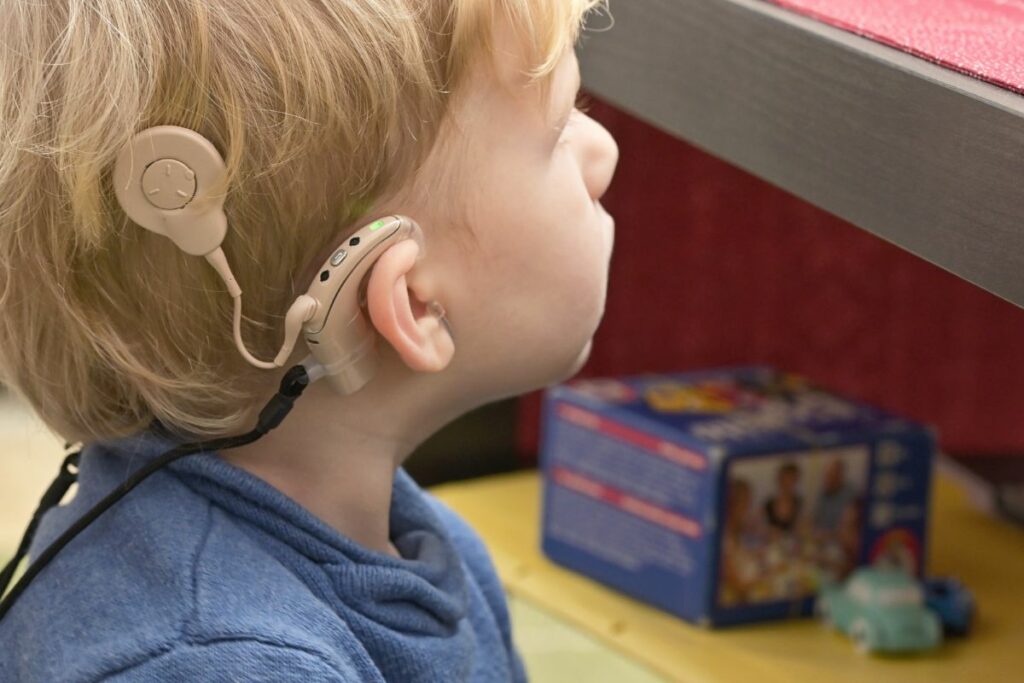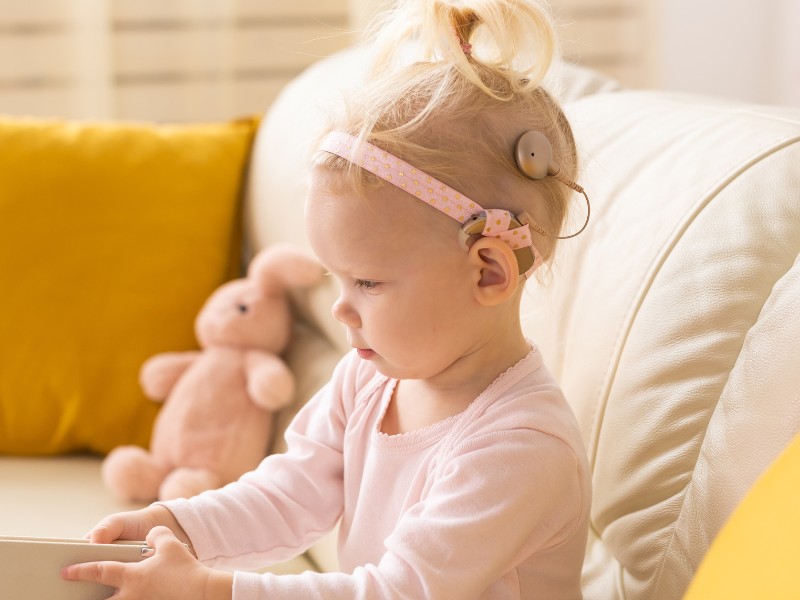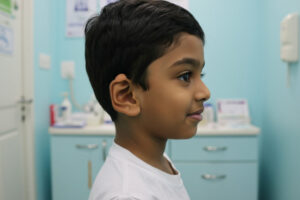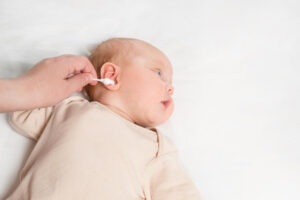Introduction
Learn about everything from selecting to the benefits of cochlear implants from the expert insights of Dr. Shree Rao, an experienced ear surgeon.
Every parent wishes to hear their child say their name. We teach children simple words like “mama” and “dada”, and as they grow, they begin to babble rhymes and repeat what they hear. However, any disruption to a child’s hearing can have a significant impact on their developmental milestones. That’s why it’s important to identify any potential hearing issues early and take the necessary steps to help your child’s development. As parents, it’s important to monitor your child’s responses to sounds, communication, and daily activities. Read on to understand when a child with hearing difficulty might require cochlear implants and how it will help them improve their life.
What is a cochlear implant?
A cochlear implant is a small electronic device that is surgically implanted in the ear to help individuals with severe to profound hearing loss. Unlike traditional hearing aids, which amplify sound, cochlear implants bypass the damaged portions of the ear and send signals directly to the hearing nerve.
Cochlear implants are often recommended for children who do not benefit from hearing aids or who have severe to profound hearing loss in both ears. With appropriate follow-up care and training, cochlear implants can help children develop speech and language skills and improve their overall quality of life
What is the right time for surgery?
Children begin learning new things from the moment they are born and achieve developmental milestones before the age of 5. If you notice that your child is missing any key hearing milestones in their early stages, it’s important to consult a pediatric ENT specialist to identify the cause.
Hearing plays a crucial role in speech and language development. By speaking with your child, you can help them develop language and learning skills. Early identification and intervention for hearing difficulties is essential to ensure that your child’s developmental stages are not disrupted. You can identify your toddler’s hearing abilities in the neonatal stage by consulting a pediatric ENT specialist.
Cochlear implant surgery timing for children varies depending on individual circumstances. The earlier the hearing condition is identified, the better the hearing condition will be. Doctors may recommend surgery to maximize the benefits of auditory stimulation and promote language development. Children with profound hearing loss conditions can receive cochlear implants from an age of 9 months, while children with severe to profound hearing loss conditions can receive cochlear implants from an age of 24 months. However, the timing of surgery will depend on the child’s individual circumstances and will be determined in consultation with a pediatric ENT specialist.

How to choose the right cochlear implant for your child?
There are different types of cochlear implants, each with its own unique features and technology. Before deciding on a particular type of cochlear implant for your child, it’s important to understand how they function and operate. This knowledge will help you manage your child’s cochlear implant and troubleshoot any issues that may arise.
It’s important to familiarize yourself with simple yet crucial tasks such as replacing batteries, recharging the device, and removing it while sleeping. By being informed and proactive about the maintenance and care of the cochlear implant, you can ensure that your child receives the maximum benefit and optimal performance from the device.
Upon examination of your child, an ENT doctor will recommend a suitable cochlear implant. Factors taken into consideration by the doctor may include audiological reasons, MRI results, your preferences for using assistive listening devices, and the quality of sound produced by the implant.
When considering cochlear implants for your child, it’s important to take into account their age, lifestyle, communication preferences, and level of hearing loss. Your ENT specialist will evaluate your child’s hearing ability and recommend suitable cochlear implant options based on various factors. They may conduct tests to determine the best approach for your child. If your child enjoys swimming or playing outdoors, you may also request a version of the implant that is water- and dust-resistant to better suit their active lifestyle.
Cochlear implants are available with different technologies, but they all have the same basic functionality. Some cochlear implants can even be connected to mobile devices, which can be a helpful feature for some families. When deciding whether a cochlear implant is right for your child, it’s important to weigh the pros and cons and consider your child’s unique needs. Your ENT doctor can help you make an informed decision.
What are the risks associated with cochlear implant surgery in children?
With many benefits of cochlear implants there are certain risks involved during the surgery they are:
- In some children, loss of balance while walking, standing, and playing can occur after the surgery
- After the surgery, they may develop tinnitus or ringing in the ears
- The side effects of anesthesia are higher in children than in adults
- Children are prone to meningitis, which is caused by streptococcus pneumonia. Administering pneumococcal vaccination after surgery will reduce the risk of meningitis in children
- Ear infections are common in children with cochlear implants
- If fever, earache, or loss of appetite are seen in children, immediately consult a pediatric ENT specialist. These conditions may indicate any underlying conditions
- Children should not undergo specific diagnostic tests with cochlear implants like ionizing radiotherapy, MRI, electrosurgery, and others, which may disrupt cochlear implants
Some benefits of cochlear implants include
- Helping children reach their language developmental milestones
- Restoring hearing to normal levels
- Enabling them to understand and respond to normal speech levels
- Developing natural language skills
- Allowing them to communicate in noisy environments
- Improving academic performance
- Enhancing overall quality of life
Life after cochlear implants in children
After cochlear implant surgery, children have shown significant improvements in their mental health, ability to learn new skills, and overall quality of life. Although the changes may be subtle during the first 6-12 months, regular speech therapy, language development, and rehabilitation are necessary to improve their condition over time. With consistent therapy sessions, there is a steady improvement in their hearing and language skills are considered as major benefits of cochlear implants.
After surgery, children will gradually develop speech and language skills. It’s important for parents to spend time with their child and encourage them to speak about different things, which can improve communication within the family, at school with friends and teachers, and in other social settings. Consistent practice and patience are key to helping your child make progress in their language development, and working with a speech therapist can also be beneficial.
Children develop their social skills and communication skills after the surgery. They feel confident participating in social activities and interactions, which can further enhance their social skills.
Conclusion
As parents, we always strive to provide the best for our children. When it comes to their hearing, cochlear implants offer superior benefits than other surgical procedures. Choosing the right cochlear implant for your child requires careful consideration of multiple factors, such as the severity of the hearing loss, the child’s age and developmental stage, lifestyle, and the device’s functionality. Although there are many benefits of cochlear implants choosing a suitable one might be a daunting task, with the help of an experienced pediatric ENT specialist, you can make a wise choice for your child. Take the first step towards better hearing for your child by providing the best cochlear implant for him. Consult a pediatric ENT specialist now and seek expert advice.

Why consult EarSurgeon, Dr. Shree Rao?
Dr. Shree Cuddapah Rao is acclaimed as one of the best pediatric ENT specialists in Hyderabad. With 10+ years of deep domain experience in the field of ENT, she is the director at Dr. Rao’s ENT Super Specialty Hospital. She underwent specialized training in Rhinoplasty / Facial Plastic surgery at Singapore General Hospital, Singapore. She also underwent advanced training in cochlear implant surgery under Padmashri Dr. Milind V Kirtane and had a Fellowship in a cochlear implant. Having performed over 200 successful cochlear implants for patients worldwide, Dr. Shree Cuddapah Rao is also the recipient of several prestigious accolades in the domain of ENT. Dr. Shree Rao is one of the best ent doctor in hyderabad, to book an appointment click here.
If you are looking for the
you can book an appointment with EarSurgeon, Dr. Shree C Rao here.







